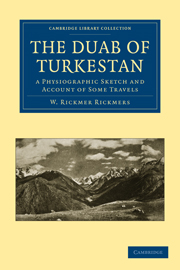Book contents
- Frontmatter
- PREFACE
- Contents
- LIST OF ILLUSTRATIONS
- CHAP. I THE DUAB OF TURKESTAN
- CHAP. II THE PHYSICAL FEATURES OF THE DUAB
- CHAP. III THE ZARAFSHAN
- CHAP. IV A VISIT TO MAKHAN-KUL
- CHAP. V BOKHARA AND THE ROAD TO KARSHI
- CHAP. VI SAMARKAND
- CHAP. VII THE ASCENT OF KEMKUTAN
- CHAP. VIII A TRIP TO THE MOUNTAINS OF URGUT
- CHAP. IX FROM SAMARKAND TO VARZIMINAR
- CHAP. X FROM VARZIMINAR TO THE ZARAFSHAN GLACIER
- CHAP. XI THE ZARAFSHAN GLACIER
- CHAP. XII TO THE MOUNTAINS OF THE FAN
- CHAP. XIII TO GARM AND THE MOUNTAINS OF PETER THE GREAT
- CHAP. XIV TUPCHEK AND THE ASCENT OF GREAT ACHIK
- CHAP. XV THE GLACIERS AND MORAINES OF TUPCHEK
- CHAP. XVI TO KALAIKHUMB AND THE YAKHSU CONGLOMERATES
- CHAP. XVII THE OXUS JUNGLES, BALJUAN, KARATAGH
- CHAP. XVIII FROM KARATAGH TO SAMARKAND
- APPENDIX
- INDEX
- LIST OF UNPUBLISHED PHOTOGRAPHS
- Plate section
CHAP. V - BOKHARA AND THE ROAD TO KARSHI
Published online by Cambridge University Press: 10 November 2010
- Frontmatter
- PREFACE
- Contents
- LIST OF ILLUSTRATIONS
- CHAP. I THE DUAB OF TURKESTAN
- CHAP. II THE PHYSICAL FEATURES OF THE DUAB
- CHAP. III THE ZARAFSHAN
- CHAP. IV A VISIT TO MAKHAN-KUL
- CHAP. V BOKHARA AND THE ROAD TO KARSHI
- CHAP. VI SAMARKAND
- CHAP. VII THE ASCENT OF KEMKUTAN
- CHAP. VIII A TRIP TO THE MOUNTAINS OF URGUT
- CHAP. IX FROM SAMARKAND TO VARZIMINAR
- CHAP. X FROM VARZIMINAR TO THE ZARAFSHAN GLACIER
- CHAP. XI THE ZARAFSHAN GLACIER
- CHAP. XII TO THE MOUNTAINS OF THE FAN
- CHAP. XIII TO GARM AND THE MOUNTAINS OF PETER THE GREAT
- CHAP. XIV TUPCHEK AND THE ASCENT OF GREAT ACHIK
- CHAP. XV THE GLACIERS AND MORAINES OF TUPCHEK
- CHAP. XVI TO KALAIKHUMB AND THE YAKHSU CONGLOMERATES
- CHAP. XVII THE OXUS JUNGLES, BALJUAN, KARATAGH
- CHAP. XVIII FROM KARATAGH TO SAMARKAND
- APPENDIX
- INDEX
- LIST OF UNPUBLISHED PHOTOGRAPHS
- Plate section
Summary
When in the opinion of orthodox fanatics the Osmanli had linked Mecca with the West, Bokhara became the spiritual centre and mainstay of the Muhammadan world. From here the mollahs of Turkey, Egypt, Morocco drew fresh impulse to religious fervour.
Bokhara was a defiant stronghold of Islam, the last bulwark of the followers of the Prophet. Here they lived in strict seclusion inimical to all outside influence, displaying and maintaining to our day the pomp, the power and the haughtiness of olden times. This was the tower of Muhammadan learning, the Rome of the Moslem, whither students congregated from all parts of the world. Here, on hallowed sites never trodden by the foot of unbeliever, the suras of the Koran resounded from the lips of venerable men. Wrapt within the heart of a continent, belted with dread mountains and fearful deserts, fringed with the lairs of murderous tribes, Bokhara-al-sherif resisted contact with the hateful Occident. The rulers on her throne were the heirs of a proud history, but they divided into small states, the caricatures of past greatness, where vaingloriousness stood for fame, oppression for might, cruelty for statesmanship. Bokhara became a scourge, the pages of its heroic traditions clotted with gore and the name of the last independent Amir the worst blemish on the mirror of history.
Already in the past the Muscovite giant had extended his arms towards the eastern seas; another stretch of his mighty limbs and the walls of Khiva crumbled and the battlements of Bokhara fell. It was not an easy kick, but it was the kick of a titan against a rotten tree.
- Type
- Chapter
- Information
- The Duab of Turkestana Physiographic Sketch and Account of Some Travels, pp. 91 - 118Publisher: Cambridge University PressPrint publication year: 2010First published in: 1913

